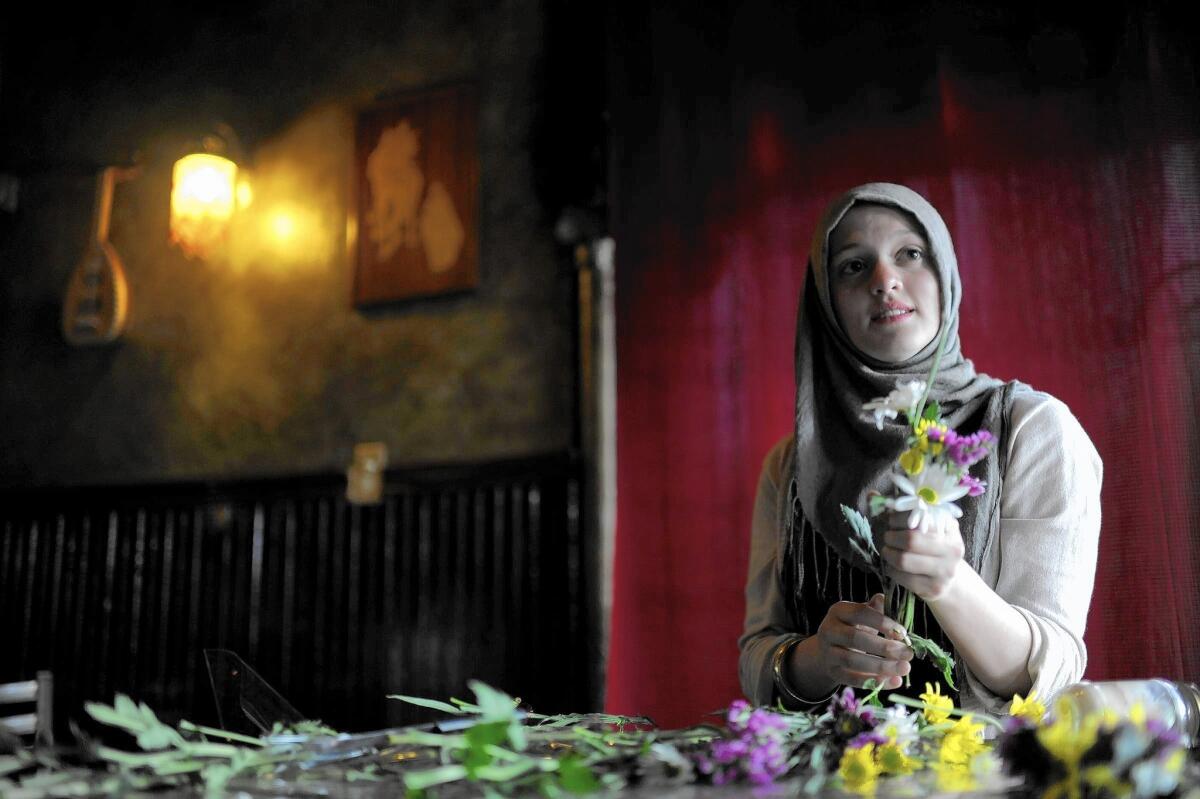Newsletter: Great Reads: A Yeats poem, a young Truman Capote and a comfort read
- Share via
Hey there. I'm Kari Howard, and I edit the Great Reads (a.k.a. Column Ones) for the Los Angeles Times.
Two of my biggest loves are narrative journalism and music, and I'm lucky that my days are filled with both: When reading the stories, I get inspired by songs I think fit the article's theme — a soundtrack.
Here are some of the past week's Great Reads, plus their soundtracks.
In Syria, a terrible beauty is born
This moment which joins us:
your eye,
a bullet,
and me.
That line from a poem called "Sniper" gives me chills. I've read it over and over, and each time — chills. The war in Syria has given birth to a terrible beauty. (Yes, I am deliberately riffing off the Yeats poem "Easter, 1916.") "Poetry is a witness," one person says. Jeffrey Fleishman is the perfect writer for the story; his writing often has the cadence of a poem: The poetry radiating from the Syrian civil war echoes with nostalgia, bombs and betrayals; it slips into the lives of torn-apart families and boys of defiance who have grown into men with bandoleers and Kalashnikovs. It is the verse of the forsaken in a nation of madmen with black flags, cities of ruin and rivers of refugees. Oh, and I recommend clicking on the video link in the story. The young poet's rage and grief moved me to unexpected tears.
Waitress Amal Kassir prepares flowers for the tables at Damascus Grill in Littleton, Colo., on April 19, 2012. (Hyoung Chang / Denver Post via Getty Images)
The soundtrack: "Damascus," by Omar Offendum. I listened to the whole "SyrianamericanA" album while working this story. Offendum is one of the poets mentioned in the piece, and his lyrics are powerful, and angry, and lovely.
"The most famous magician on planet Earth is a guy you've never heard of."
Though he has made the space shuttle disappear, levitated Michael Jackson and filled scores of stadium shows across Asia, magician Franz Harary has neither the debonair air of a David Copperfield nor the goth theatricality of a Criss Angel to mark him as a celebrity offstage. Witness this scene at a guard station in the massive new Studio City casino in Macau, the Las Vegas of China. The guard asks Harary if he has a pass to get in. "My name's in the computer," Harary tells the guard with not a hint of annoyance. "Have a look." But now, the Hollywood-based illusionist can just point to the marquee. On Tuesday, the casino opened Franz Harary's House of Magic, a permanent, $40-million venue with a rotating cast of magicians. With room for 300 patrons per show (tickets: $50) and plans for up to four performances daily, Harary's House of Magic aims to help Macau do what Sin City did 15 to 20 years ago: start shedding its seedy image and adding more family-friendly entertainment to diversify the city's customer base.
Magician Franz Harary performs an act that entails getting into a coffin-like box that is set ablaze, then appears to vanish. He then rematerializes in a ring of fire. (Julie Makinen / Los Angeles Times)
The soundtrack: "Magic," by the Cars. The offbeat syncopation. The tinny-sounding keyboard. The drums that sound like a drum machine even if they aren't. And Ric Ocasek's twitchy vocals. Ahh, this is the sound of the '80s.
The struggles of Stephanie Valdivia — "the worst kid ever"
I recently came across the term "Slow Journalism," which I love. It's the opposite of the now-now-now of the news cycle today. Yes, we need the "now." But we also need to follow stories from the "now" to their ends. And that is what writer Teresa Watanabe and photographer Barbara Davidson have done: They spent two years following the life of a troubled teenage girl named Stephanie Valdivia. When Stephanie reported to her probation officer at the Camp Scott detention center, he looked at her rap sheet, drug addictions and failing grades and cursed his bad luck for getting another loser. "I thought she was going to be a bad, bad kid. The worst kid ever. When I saw her I said, 'Please, no. Reassign her.' " But as Stephanie went through a new program at the camp, she blossomed. She became a leader and an academic star. Life on the outside, however, has been a year full of trials. I'm so proud that The Times nurtures this kind of "slow journalism" project.
Stephanie Valdivia high-fives her Camp Scott math teacher, Charlie Phelps, before going on stage at the Walt Disney Concert Hall in Los Angeles for the graduation ceremony. (Barbara Davidson / Los Angeles Times)
The soundtrack: "Some Better Day," by I Am Kloot. I'll always be indebted to one of my friends for introducing me to I Am Kloot. You know how certain bands just speak to you? Singer John Bramwell is that wonderful combination of smart and funny, bitter and romantic.
What I'm reading online
When I saw that the New Republic had an "undiscovered" short story by a young Truman Capote, I braced for it to be a spoof, like the one someone did recently with Raymond Carver. But this looks like the real thing. Part of me itched to edit it, to lose the high-schooler-trying-too-hard bits. But some lines were shot through with brilliance. This: She felt that maybe she had been born to be lonesome just as some people are born blind or deaf. And this: She sat silent, listening to the cheap alarm clock, tick-tock, tick-tock. And especially this: When she had told the lie, she felt her stomach sink; she felt as if she were falling through a thousand years.
What's on my bedside table
Sometimes only a comfort read will do, the kind of book you've read a million times before because you know it will cocoon you in good feelings. (Hmm, I want male readers to tell me what, or if, they do the comfort-read thing.) My four favorites: "The Enchanted April," "I Capture the Castle," "Cold Comfort Farm" and "We Took to the Woods." This week, I decided on "The Enchanted April," which is like taking a happiness pill. Written in 1922, it's about four unhappy women who leave a dreary London winter for a month in Italy — and no, they're not all fabulously rich. Wonderful things ensue, of course. One great quote: “I'm sure it's wrong to go on being good for too long, till one gets miserable. And I can see you've been good for years and years, because you look so unhappy.” (The movie is almost as good as the book, FYI...)
What's on my turntable
Although I spend most of my time listening with headphones to Spotify, sometimes I want to hear the needle touching down on vinyl. That's why I have a turntable in my office — and two at home (one inside, and a battery-powered one outside when the weather's fine — which it usually is in Southern California). This week's vinyl: "Natalie Prass," by Natalie Prass. This is one of my rare new (read: expensive) albums. I got it because I love its producer, Matthew E. White. Last week, I saw Prass at a show at the Echoplex and was surprised by how different she was from her appearance at the Outside Lands music festival a few months back. She was playful, kind of manic pixie girl meets young Blanche DuBois. I think the guys were all falling in love with her.
Want to chat? Have a great idea for a Great Read? I'm @karihow on Twitter and [email protected] on email.


